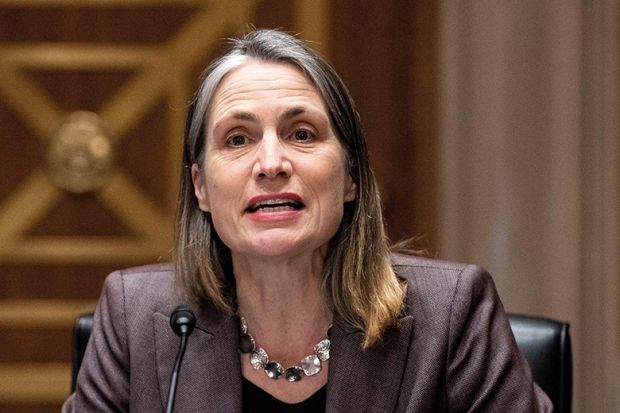After a path through elite universities that took a miner’s daughter to the White House, incoming Durham University chancellor Fiona Hill aims to work on helping higher education spread its benefits beyond elites at a time when its “future is on the line”.
Dr Hill’s book, There Is Nothing for You Here: Finding Opportunity in the 21st Century, covered her journey from growing up in Bishop Auckland to a degree in Russian at the University of St Andrews (after an “awful” experience at a University of Oxford interview), a PhD at Harvard University, and a career advising three US presidents on Russian and European affairs.
Her final US government appointment came when Donald Trump made her deputy assistant to the president and senior director for European and Russian affairs on the National Security Council – a role that eventually led to her testifying during his 2019 impeachment.
Her book covers “the political effects of deindustrialisation” in the US, UK and Russia as well as her own story of social mobility through education, Dr Hill told Times Higher Education after being announced as Durham’s next chancellor, starting in June.
“The problem, of course: it’s through elite education,” she added.
Dr Hill, a senior fellow in the Center on the United States and Europe at the Brookings Institution, a US thinktank, has recently been looking at access to higher education in the US for disadvantaged and rural students, including via interviews with University of Pittsburgh students.
One element that interests her is how universities can do more for their communities, “so that you’re not just basically having a big sucking noise of everything coming into these elite educational institutions and they’re not having knock-on effects on the broader community”.
In taking the role at Durham – a prestigious institution known for the low proportion of students it takes from the surrounding region and for tensions between town and gown – is she heading for a university that sometimes embodies that kind of disconnect?
“That was actually one of the reasons I think they [Durham] reached out to me and I was put on the [candidate] list,” Dr Hill said.
“I’ve got a lot of ties with St Andrews…but I really felt that trying to draw attention to all these issues is pretty critical.”
She added: “I don’t know how much people inside higher education are fully cognisant…about how much the future of higher education is on the line here, in the United Kingdom and United States.
“People look at the UK and US as the superpowers of education, but we’ve such huge…inequalities of access to education.”
By way of arguing that the UK has “lost the plot” on adult and continuing education, Dr Hill pointed to the scale of the 1918 Education Act, which raised the school leaving age to 14, abolished all fees in state elementary schools and sought to help soldiers returning home after the First World War “adapt to what was already a changing economy”.
The UK has been through “so many phases” of economic change since “and education hasn’t kept up with it”, she said. “We’ve had all kinds of education acts, expansion of education, but it’s all been more emphasis on the individual; whereas if you look back to [the 1918 act], it was more of a national effort to make the country competitive again after World War One, and we tried it again after World War Two.
“Well, we’re in a perpetual situation now where both the United Kingdom and United States are not keeping up with the rapidity of [economic] changes and a lot of it is because of this lack of access to education in all forms.”
Dr Hill said she was keen to learn more about universities’ roles in their regions, “which places are doing things well, which are not, what are the issues that universities can’t solve – I don’t think universities can solve all the transportation issues, for example, but they can highlight them”.
“What’s interesting about the north-east of England…is there’s a cluster of really excellent educational institutions with all kinds of different profiles,” continued Dr Hill, who recently received an honorary doctorate from the University of Sunderland.
The five universities in the north-east – Teesside, Sunderland, Northumbria, Newcastle and Durham – plus the region’s further education colleges amount to “a real cluster here that you ought to be able to bring together”, said Dr Hill, highlighting Scotland’s greater success than England in “pooling and sharing” between its universities.
Part of her hope for the Durham role was to take a national look at “how higher education can really live up to its promise of having benefits not just for an elite few, but…for communities, for regions and the country at large”.
Register to continue
Why register?
- Registration is free and only takes a moment
- Once registered, you can read 3 articles a month
- Sign up for our newsletter
Subscribe
Or subscribe for unlimited access to:
- Unlimited access to news, views, insights & reviews
- Digital editions
- Digital access to THE’s university and college rankings analysis
Already registered or a current subscriber? Login








